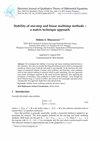Existence and multiplicity of eigenvalues for some double-phase problems involving an indefinite sign reaction term
IF 0.8
4区 数学
Q1 MATHEMATICS
Electronic Journal of Qualitative Theory of Differential Equations
Pub Date : 2022-01-01
DOI:10.14232/ejqtde.2022.1.5
引用次数: 1
Abstract
一类含不定符号反应项的双相问题特征值的存在性和多重性
我们研究了以下一类双相非线性特征值问题- div (φ (x, |∇u |)∇u + ψ (x, |∇u |)∇u] = λ f (x, u)in Ω, u = 0 on∂Ω,其中Ω是rn的有界域,势能函数φ和ψ有(p1 (x);p2 (x))变量增长。问题的反应项的原语(右侧)在变量u中有不定符号,允许我们研究在+∞附近增长较慢的函数,即它不满足Ambrosetti-Rabinowitz条件。在这些假设下,我们证明了对于每一个参数λ∈R +∗,问题有一个无界弱解序列。这些证明依赖于基于能量估计的变分论证和喷泉定理的使用。
本文章由计算机程序翻译,如有差异,请以英文原文为准。
求助全文
约1分钟内获得全文
求助全文
来源期刊
CiteScore
1.40
自引率
9.10%
发文量
23
审稿时长
3 months
期刊介绍:
The Electronic Journal of Qualitative Theory of Differential Equations (EJQTDE) is a completely open access journal dedicated to bringing you high quality papers on the qualitative theory of differential equations. Papers appearing in EJQTDE are available in PDF format that can be previewed, or downloaded to your computer. The EJQTDE is covered by the Mathematical Reviews, Zentralblatt and Scopus. It is also selected for coverage in Thomson Reuters products and custom information services, which means that its content is indexed in Science Citation Index, Current Contents and Journal Citation Reports. Our journal has an impact factor of 1.827, and the International Standard Serial Number HU ISSN 1417-3875.
All topics related to the qualitative theory (stability, periodicity, boundedness, etc.) of differential equations (ODE''s, PDE''s, integral equations, functional differential equations, etc.) and their applications will be considered for publication. Research articles are refereed under the same standards as those used by any journal covered by the Mathematical Reviews or the Zentralblatt (blind peer review). Long papers and proceedings of conferences are accepted as monographs at the discretion of the editors.

 求助内容:
求助内容: 应助结果提醒方式:
应助结果提醒方式:


